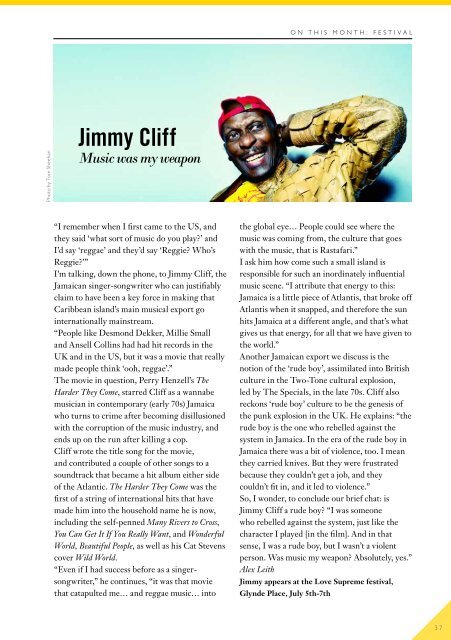Create successful ePaper yourself
Turn your PDF publications into a flip-book with our unique Google optimized e-Paper software.
ON THIS MONTH: FESTIVAL<br />
Photo by Tom Sheehan<br />
Jimmy Cliff<br />
Music was my weapon<br />
“I remember when I first came to the US, and<br />
they said ‘what sort of music do you play?’ and<br />
I’d say ‘reggae’ and they’d say ‘Reggie? Who’s<br />
Reggie?’”<br />
I’m talking, down the phone, to Jimmy Cliff, the<br />
Jamaican singer-songwriter who can justifiably<br />
claim to have been a key force in making that<br />
Caribbean island’s main musical export go<br />
internationally mainstream.<br />
“People like Desmond Dekker, Millie Small<br />
and Ansell Collins had had hit records in the<br />
UK and in the US, but it was a movie that really<br />
made people think ‘ooh, reggae’.”<br />
The movie in question, Perry Henzell’s The<br />
Harder They Come, starred Cliff as a wannabe<br />
musician in contemporary (early 70s) Jamaica<br />
who turns to crime after becoming disillusioned<br />
with the corruption of the music industry, and<br />
ends up on the run after killing a cop.<br />
Cliff wrote the title song for the movie,<br />
and contributed a couple of other songs to a<br />
soundtrack that became a hit album either side<br />
of the Atlantic. The Harder They Come was the<br />
first of a string of international hits that have<br />
made him into the household name he is now,<br />
including the self-penned Many Rivers to Cross,<br />
You Can Get It If You Really Want, and Wonderful<br />
World, Beautiful People, as well as his Cat Stevens<br />
cover Wild World.<br />
“Even if I had success before as a singersongwriter,”<br />
he continues, “it was that movie<br />
that catapulted me… and reggae music… into<br />
the global eye… People could see where the<br />
music was coming from, the culture that goes<br />
with the music, that is Rastafari.”<br />
I ask him how come such a small island is<br />
responsible for such an inordinately influential<br />
music scene. “I attribute that energy to this:<br />
Jamaica is a little piece of Atlantis, that broke off<br />
Atlantis when it snapped, and therefore the sun<br />
hits Jamaica at a different angle, and that’s what<br />
gives us that energy, for all that we have given to<br />
the world.”<br />
Another Jamaican export we discuss is the<br />
notion of the ‘rude boy’, assimilated into British<br />
culture in the Two-Tone cultural explosion,<br />
led by The Specials, in the late 70s. Cliff also<br />
reckons ‘rude boy’ culture to be the genesis of<br />
the punk explosion in the UK. He explains: “the<br />
rude boy is the one who rebelled against the<br />
system in Jamaica. In the era of the rude boy in<br />
Jamaica there was a bit of violence, too. I mean<br />
they carried knives. But they were frustrated<br />
because they couldn’t get a job, and they<br />
couldn’t fit in, and it led to violence.”<br />
So, I wonder, to conclude our brief chat: is<br />
Jimmy Cliff a rude boy? “I was someone<br />
who rebelled against the system, just like the<br />
character I played [in the film]. And in that<br />
sense, I was a rude boy, but I wasn’t a violent<br />
person. Was music my weapon? Absolutely, yes.”<br />
Alex Leith<br />
Jimmy appears at the Love Supreme festival,<br />
Glynde Place, <strong>July</strong> 5th-7th<br />
37


















